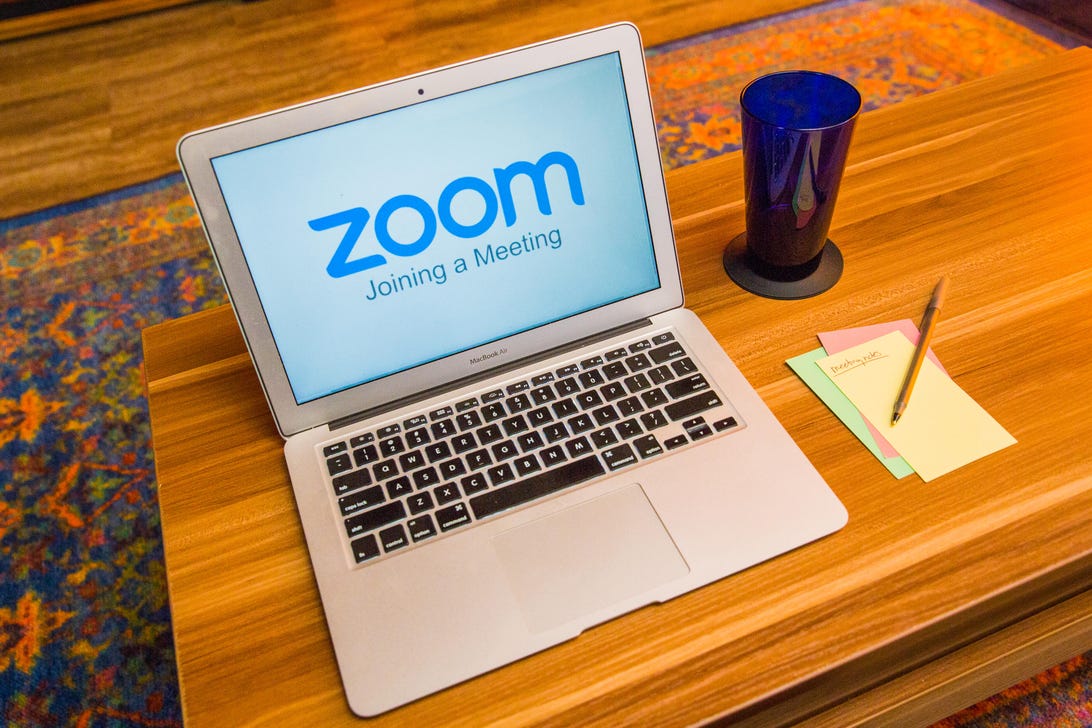My Upload Isnt Working on My Sit

You know your upload speed is poor if your Zoom meetings stall or freeze.
Sarah Tew/CNETThere's a reason most cyberspace providers promote a programme's download speeds while treating upload speeds as an afterthought. Downloading dominates what we use the cyberspace for, from streaming TV and music to viewing this webpage. Consequently, internet providers prioritize download speeds, often leaving customers with upload speeds that are significantly lower.
So what's up with upload speeds? Are they equally inconsequential as some providers would advise, or do they play a bigger function in our connected lives than they get credit for? I'll explain why your upload speeds are important, why they may exist slow and how you lot can improve them.
Read more:Which cyberspace speed test should you use to test your connectedness at home?
What are upload speeds used for?
Upload speed determines how fast you lot can send, or upload, information from your computer or device to the internet. This includes uploading files, such as pictures and videos to social media or homework assignments, only upload speeds are also essential to video conferencing, VOIP calling and online gaming.
Like to how download speeds bear on picture and sound quality when streaming a bear witness on your Boob tube, your upload speeds affect how others see and hear you on the other end of your video briefing or online game. Slow or unstable upload speeds are frequently the cause of awkward frozen screens and cleaved audio when using apps similar Skype or Zoom.
What's a skilful upload speed?
When using a wired connection on a unmarried device, upload speeds of 5Mbps or higher are generally considered "skillful" as they will support nearly activities that crave uploading data, including video calls in HD quality and gaming online. If yous primarily employ Wi-Fi or foresee using upload bandwidth on multiple devices at once, aim for upload speeds of 10Mbps or higher.
Minimum requirements for calling and video conferencing
The FCC considers any upload speed of 3Mbps or higher as "broadband." Even so, the FCC set this speed threshold (along with its broadband download speed of 25Mbps) back in 2015 and has since received bipartisan congressional pressure to raise the bar on what is officially considered broadband.
Still, the FCC standard of 3Mbps is enough on newspaper, albeit not by much, to run into virtually of the minimum requirements for applications such as Skype and Zoom. Skype recommends a minimum of 100Kbps for calling and 512Kbps for group video chats of vii or more people. Zoom is a bit more demanding, requiring a minimum of 600Kbps for i:1 video calling and three.8Mbps for 1080p HD video grouping calling.
Keep in heed that these are the minimum requirements and you're likely to benefit from much faster speeds, then it's a good thought to know what your speeds are and what can bear on them.

Why are my upload speeds so tiresome?
A adept speed test will give you an idea of what your upload speeds are. Of course, if you've been experiencing excessive lagging and freezing when on video calls, y'all might not need to run a speed test to know your upload speeds are not up to par with your needs.
If your upload speeds fall beneath your needs or expectations, there are a number of factors that can contribute to slow speeds.
That's just what y'all get
The main culprit of slow upload speeds, especially when compared to your download speeds, is the internet plan itself. Plans from most internet service providers, with the exception of cobweb internet service, typically come with max upload speeds effectually a 10th or less of their advertised download speeds. If yous sign up for an internet plan with max download speeds of 50Mbps, you lot tin can likely look peak upload speeds of 5Mbps or less.
Most cablevision internet providers, including Cox, Spectrum and Xfinity, have max upload speeds of 30 to 35Mbps, even though gigabit download speeds are often available. The same goes for about DSL and satellite internet services; upload speeds are far lower than the advertised download speeds.
How to ready it: The all-time matter you can practice is detect out what the bachelor max upload speeds are with a particular provider or plan before signing up. Near providers volition list upload speeds on their website, but you may accept to look through the fine print or plan details to find it.
If you lot already have cyberspace service, you may desire to consider upgrading to a faster plan. You'll likely not only go faster upload speeds merely also a overnice boost in download speeds. Switching providers is also an choice, especially if cobweb optic service from providers such as AT&T, CenturyLink, Google Fiber or Verizon Fios are available. Fiber technology supports the bandwidth required for symmetrical or about-symmetrical download and upload speeds. So if y'all sign up for a 300Mbps plan, you can expect download and upload speeds of around 300Mbps over a wired connectedness.
All of the new routers appear at CES 2021 -- including side by side-gen Wi-Fi 6E
Run across all photosWi-Fi is always slower
Wi-Fi is an alternative to a wired connection, non its ain carve up net service. If y'all use a Wi-Fi connexion, look download and upload speeds to be half or less than your plan's max advertised speeds, which are intended for a wired connection.
Range and obstructions can exist issues when using Wi-Fi as well. The farther you lot motion away from your router, or if you move to a dissimilar room or floor, the lower your upload speeds are likely to be.
How to fix it: Using a wired Ethernet connection volition about always give you a faster, more reliable connection. Effort using a wired connection if you need fast, stable upload speeds for an important coming together or school project.
A wired connectedness isn't always practical and Wi-Fi is much more user-friendly, so there volition often exist times when Wi-Fi is your only option. At that place are a number of ways to improve your Wi-Fi connection, such equally elevating your router or repositioning the antennas.
An equipment upgrade is also an effective style to improve your Wi-Fi speeds. If you're not certain where to outset with purchasing a new router, run into our list of the best Wi-Fi routers. And for improve whole-abode Wi-Fi connectivity, consider upgrading to a dual-ring mesh router organisation.
Multiple upload tasks are active at the same time
At that place's only so much bandwidth available. When you have multiple video conferences going at once, they may all be competing with ane another, bringing downwardly anybody'southward available upload speeds. While simultaneous meetings or class participation can be unavoidable, try to stagger meetings and limit the number of connected devices whenever possible.
How to fix it: Aside from strategically scheduling meeting times to accommodate everyone in your household, brand sure your router is set to broadcast 2.4GHz and 5GHz bands. At that place's likely to exist less clutter on your 5GHz band, assuasive for better connection quality and faster upload speeds.
Additionally, upgrading your internet plan or provider to one with faster max upload speeds will help ensure there is enough to become around.
You've reached your monthly data cap
Believe information technology or not, uploading files and participating in video calls contribute to your monthly information usage only the aforementioned every bit downloading files or streaming Tv set. Depending on your provider, exceeding your data limit tin can result in throttled speeds for the balance of your billing cycle.
This is likely to but exist an issue if you have satellite internet. HughesNet and Viasat will drastically reduce speeds once a customer has surpassed their monthly data allowance. Select DSL and cable internet providers may also take data caps, but most will accuse an overage fee instead of throttling your speeds.
How you can fix it: If you have a monthly data cap, it'due south best to monitor your activeness throughout the billing cycle to avert going over. Most providers have an app and/or website that lets you lot keep track of your data usage.
HughesNet customers can purchase additional data in 3, 5, 10 or 25GB blocks, which will restore their speeds until the adjacent billing wheel or the actress data is used. Viasat does not offer additional data packets for purchase, simply Viasat plans are likely to come with more data that similarly priced HughesNet plans.
Of form, your all-time option is to choose an internet provider with no data cap, or at to the lowest degree one that won't throttle your speeds for going over your limit. Y'all'll still want to continue an eye on your data usage, all the same, as excessive data utilise could violate your service term agreement, which may result in service interruption.
Looking for more than ways to improve your internet connection? Visit the CNET net hub folio for more articles featuring all things related to your abode internet service.
Source: https://www.cnet.com/home/internet/upload-speeds-explained/
0 Response to "My Upload Isnt Working on My Sit"
Post a Comment